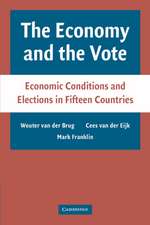Electoral Systems and Political Context: How the Effects of Rules Vary Across New and Established Democracies
Autor Robert G. Moser, Ethan Scheineren Limba Engleză Paperback – 27 sep 2012
| Toate formatele și edițiile | Preț | Express |
|---|---|---|
| Paperback (1) | 263.00 lei 6-8 săpt. | |
| Cambridge University Press – 27 sep 2012 | 263.00 lei 6-8 săpt. | |
| Hardback (1) | 553.36 lei 6-8 săpt. | |
| Cambridge University Press – 27 sep 2012 | 553.36 lei 6-8 săpt. |
Preț: 263.00 lei
Nou
Puncte Express: 395
Preț estimativ în valută:
50.32€ • 52.68$ • 41.64£
50.32€ • 52.68$ • 41.64£
Carte tipărită la comandă
Livrare economică 05-19 aprilie
Preluare comenzi: 021 569.72.76
Specificații
ISBN-13: 9781107607996
ISBN-10: 110760799X
Pagini: 303
Ilustrații: 29 b/w illus. 22 tables
Dimensiuni: 155 x 238 x 16 mm
Greutate: 0.44 kg
Ediția:New.
Editura: Cambridge University Press
Colecția Cambridge University Press
Locul publicării:New York, United States
ISBN-10: 110760799X
Pagini: 303
Ilustrații: 29 b/w illus. 22 tables
Dimensiuni: 155 x 238 x 16 mm
Greutate: 0.44 kg
Ediția:New.
Editura: Cambridge University Press
Colecția Cambridge University Press
Locul publicării:New York, United States
Cuprins
1. Introduction: why don't electoral rules have the same effects in all countries?; 2. When do the effects of electoral systems diverge from our expectations?; 3. Mixed-member electoral systems: how they work and how they work for scholars; 4. How democratic experience and party system development condition the effects of electoral rules on disproportionality and the number of parties: theory, measurement, and expectations; 5. How democratic experience and party system development condition the effects of electoral rules on disproportionality and the number of parties: what we actually see; 6. Political context, electoral rules, and their effects on strategic and personal voting; 7. How democratic experience and party system development condition the effect of electoral rules on strategic defection; 8. Social diversity, electoral rules, and the number of parties; 9. How political context shapes the effect of electoral rules on women's representation; 10. Conclusion: why and how political context matters for electoral system effects.
Recenzii
“This is the most important study to date on the most widespread electoral reform phenomenon of the 1990s and the first decade of this century – mixed-member systems. Moser and Scheiner take nothing for granted. They subject everything we thought we knew about the effects of electoral rules to renewed scrutiny. In the process, they turn much of the conventional wisdom on its head, and they set a new standard for scholarship on institutional design in new democracies.” – John Carey, Dartmouth College
“Electoral Systems and Political Context makes a profound contribution to the advancement of the electoral systems literature. Moser and Scheiner adroitly take advantage of the unique natural experiment that exists within many of the world's diverse population of mixed-member electoral systems to better understand how the political context within which electoral rules operate influences their impact on key aspects of the political system such as party fragmentation and women's representation.” – Mark P. Jones, Rice University
“In a series of impressive chapters, Moser and Scheiner show how political and social contexts shape the effects of electoral rules on the number of parties, the disproportionality of vote-seat representation, strategic voting, women’s representation, and other political outcomes. They show that many of the generalizations in the current literature hold only in particular conditions. In other conditions we expect and find different outcomes. I expect Electoral Systems and Political Context to become a classic.” – G. Bingham Powell, Jr., University of Rochester
“Moser and Scheiner force us to reconsider the conditions under which electoral system expectations to play out in practice. The book’s scope is global and its quantitative analysis is at the level of individual districts and legislators – the level at which many key hypotheses about electoral systems logically should be tested, but seldom are. This book will be of interest not only to specialists in electoral systems but also to a broader readership in comparative politics.” – Matthew S. Shugart, University of California, San Diego
“Electoral Systems and Political Context makes a profound contribution to the advancement of the electoral systems literature. Moser and Scheiner adroitly take advantage of the unique natural experiment that exists within many of the world's diverse population of mixed-member electoral systems to better understand how the political context within which electoral rules operate influences their impact on key aspects of the political system such as party fragmentation and women's representation.” – Mark P. Jones, Rice University
“In a series of impressive chapters, Moser and Scheiner show how political and social contexts shape the effects of electoral rules on the number of parties, the disproportionality of vote-seat representation, strategic voting, women’s representation, and other political outcomes. They show that many of the generalizations in the current literature hold only in particular conditions. In other conditions we expect and find different outcomes. I expect Electoral Systems and Political Context to become a classic.” – G. Bingham Powell, Jr., University of Rochester
“Moser and Scheiner force us to reconsider the conditions under which electoral system expectations to play out in practice. The book’s scope is global and its quantitative analysis is at the level of individual districts and legislators – the level at which many key hypotheses about electoral systems logically should be tested, but seldom are. This book will be of interest not only to specialists in electoral systems but also to a broader readership in comparative politics.” – Matthew S. Shugart, University of California, San Diego
Notă biografică
Descriere
This book highlights how new and established democracies differ from one another in the effects of their electoral rules.
















